This article originally appeared in the History of the Fire Department, East Liverpool, Ohio 1911, The Jos. Betz Printing Company East Liverpool, Ohio.
HISTORY OF THE FIRE DEPARTMENT
In writing the history of this department of the city government-organized in the beginning by men who volunteered their services, risked life and limb without anticipating either reward or favorable mention-it has been the custom, if not the rule, to say much of the heroism and of the heroes thus employed, but the main thing to be considered is efficiency. It has been said that the occasion always finds the hero, but it is more true that the occasion is in the way of the hero and in the service of the people, at a mere pittance compared with what risk he runs. The efficiency is more to be desired than the heroism, because to be efficient carries with it the necessity to meet every emergency with heroism.
In writing the history of the Fire Department of East Liverpool, which, while it has had its heroes to meet every occasion demanding a show of heroism, as has been shown by those who have gone to death by performance of their duties, the record and reputation of the department has gone to the people more on its record of efficiency and less on the fatalities recorded than from property loss.
The record of the Department is better shown because of the protection afforded. The Department has been compelled to combat the presence of modern fire-proof buildings-except in rare and extraordinary cases, making the work more arduous; and above all, the lack of adequate equipment which the tax levy made impossible. The full quota of men also served as a handicap, and made the lack of heavy property loss and risk of life and limb more remarkable.
The best compliment that can be bestowed upon the East Liverpool Fire Department is to be expressed in the statement that it has never hesitated in the performance of duty; that it has ever been prompt in its response to duty; has established a record for efficiency and daring equaled by few and surpassed by none in the country, considering the numbers and experience. The efficiency has been made possible by the spirit of loyalty and devotion to duties to be performed, and for the record maintained by the members of the fire department for their duties as public servants. In counting the roll, man for man, from the highest in command to the latest appointed cadet, the city of East Liverpool has every reason to be proud of, and have unbounded satisfaction in the record made and the services rendered by it.
Those engaged in the performance of public service are looked upon with slight attention when so occupied, and the general public is prone to give little heed to the heroic acts, thoughtfulness and efficiency in that service.

First, the demand calls for those who fear no danger, the sleepless attention; prompt responses in fair weather or foul; to meet every emergency without thought of faltering because danger threatens, to risk their own that other's lives may be preserved, and to perform duty that demands the highest display of valor uncomplainingly, at all times, and under all circumstances. Those who enjoy this protection of life and property little know what the alarm at midnight means to the men who are thus aroused to duty, and who must give no heed to storm, and cannot take cognizance of conditions that would appal to those not sworn to the performance of such duty.
There are compliments to be bestowed in writing the history; facts, more than history are to be desired. Coming to the facts in the history of the East Liverpool Fire Department, it has no failures recorded against its record. Statistics prove that it has, in the performance of its duties, made for the city of East Liverpool one of the places safe from the ravages of the fire demon. On many occasions the Department of East Liverpool has been tried to the limit, and it has never been found wanting either in bravery or efficiency.
It is not only in the fighting of fires that the members of the fire department are called upon for performance of duty, but times when other duties threaten-of storm and flood, it is to the fire department that the people look for rescue and relief. If a flood sweeps upon the community and lives and property are endangered, it is to the firemen that the appeal goes forth to come to the rescue, and as promptly and valiantly as the call has been answered for fire have the alarms in such emergencies been responded to. In every case they have willingly and gallantly answered the call rendering all assistance possible.
In this brief history need not be written the incidents of duty performed, the acts of chivalry and heroism performed by the individual members of the Department, for they have been recorded in the columns of the daily press that all may read and know. The history would not be complete, however, unless occasion was taken to recall the many hazardous acts accomplished and successfully executed at the hands of those to whom they have reason to look for succor in times of distress, protection in times of threatened danger, rescue and relief when the need is real.
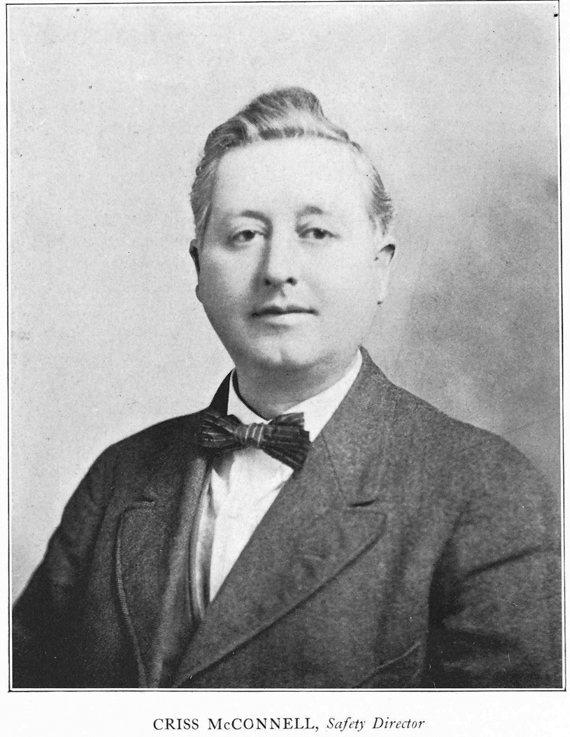
H. C. Morley
One of the greatest calamities that ever befel the East Livpool fire department occurred when H. C. Morley, chief for many years, was seized with apoplexy or some similar heart affection while directing one of the most stubborn fires since the paid department was organized. An alarm reached Central station from what was then West Market street-now Dresden avenue- where it was found that fire in the two story frame building owned and occupied by John C. Wright and others, was well under way. The members of the department did valiant service that day, and it was at a moment when Chief Morley, by superior intellect and long service, had succeeded in snatching victory from defeat that he was prostrated. His comrades hastened to his aid and everything possible was done to restore the fallen chieftain, but it was of no avail. He succumbed without regaining consciousness. Chief Morley's death occurred Sept 3, 1907, and it was many months before his old associates recovered from the shock and matters resumed the normal about headquarters.
Chief Morley came from the ranks of the old volunteers, earning promotion from one stage to another, until, in May, 1896, a regular paid fire department was established, with "Clint" Morley in charge. At that time the entire brigade consisted of the chief and eight men.
James F. McCullough
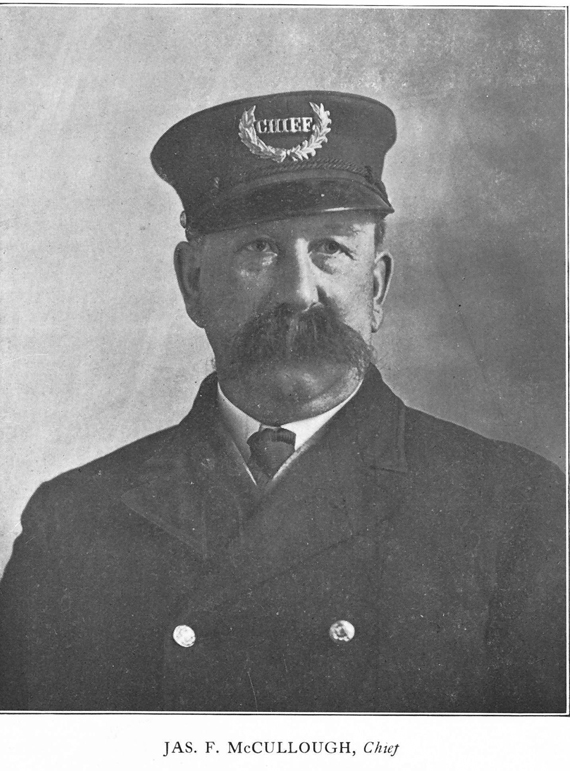
Upon the death of Chief Morley in 1907, James F. McCullough, who had served as assistant chief since the paid department was inaugurated in East Liverpool, was promptly made head of the fire laddies in the Crockery City. Well and faithfully has he fulfilled his duties, hundreds of property owners owing it to his ingenuity and careful direction that their property was saved from the grasp of the fire demon. Chief McCullough is a Yankee by birth, having first seen the light of day at Walton, Mass., nearly half a century ago. He was a street man in the old volunteer days, and while the village equipment was kept in a shed built on the east side of the present city hall, it was a part of his duties to sleep there and in case an alarm came in to answer with one horse and an old- fashioned hose reel. Chief McCullough has practically grown up with the department, such as it is. He is well liked by his men and by the public, all of whom have the most implicit confidence in his ability to perform the duties of the position.
Thomas G. Bryan
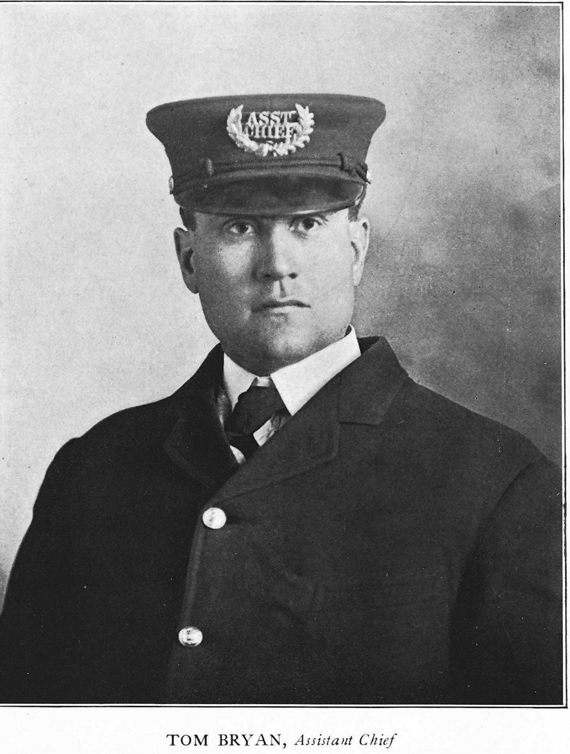
Is the capable Assistant Chief of the Fire Department. He was born October 6th, 1868, and entered the service of the department eighteen years ago. Bryan has had experience in every branch of the department and is recognized as one of the most fearless and intrepid members of the department. He is the driver of the three-way hitch chemical wagon. It is needless to tell the people who have seen this wagon go to the fires just how it is handled. As a fire fighter he stands in the front rank.
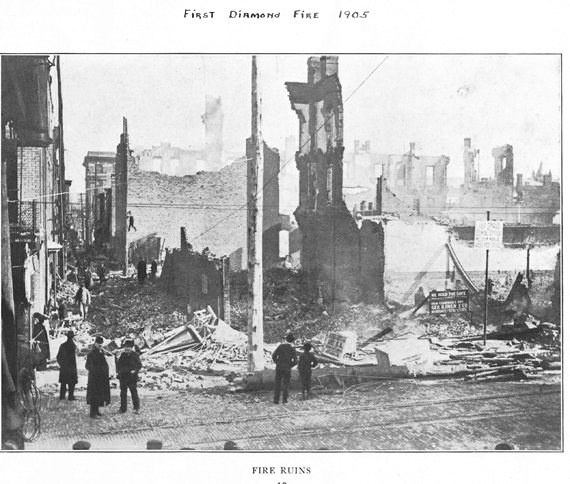
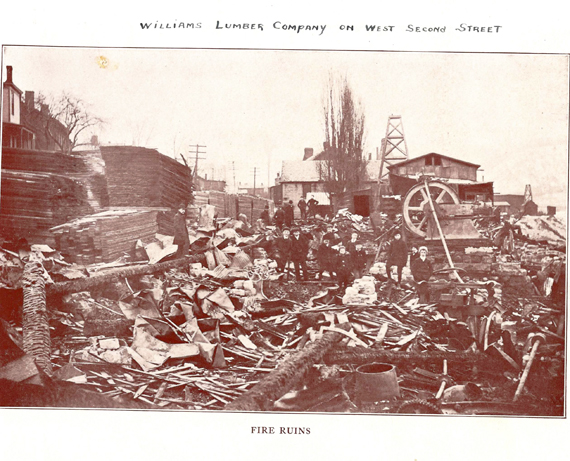
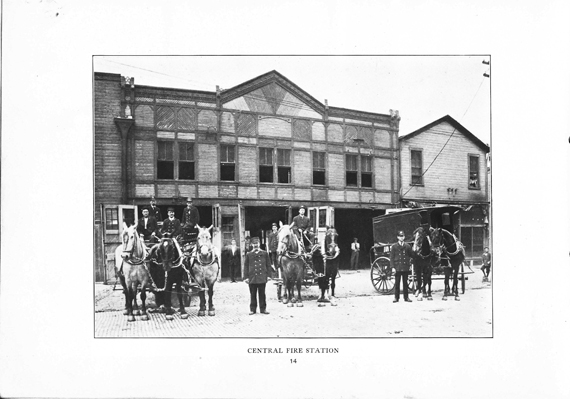
The Men at Central Station
James F. McCullough Chief
Thomas G. Bryan_ Asst. Chief
Elmer D. McMillen _ _ Fireman
Clyde Supplee _ _ Fireman
Edward Burns Fireman
Harley Fuller Fireman
Harry Aufderheide Fireman
Smith Fowler _Substitute Fireman
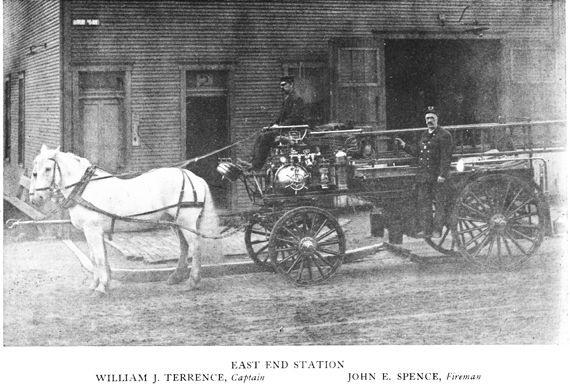
The Volunteers
Many of the older residents of East Liverpool still point to their service in the old volunteer fire brigade with as much pride as the average soldier to his war record. And justly, too, since it was the best ever organized in that period. B. M. Adam, lately a resident of Leetonia, was chief for many years. Every member shared in the honors at any and all calls. The equipment at that time consisted of a hand reel, which was always well manned, and a village hook and ladder-afterwards fitted with shafts and one horse hitch. The latter course was adopted because of the peculiar construction of the truck. When hauled by the men someone was bound to get a trifle exc'ted and in such an event the outfit was invariably upset and the run delayed. The old hose reel is still in commission, though seldom used. The hook and ladder has long since passed to the junk pile. Everything considered, East Liverpool had a well organized, fairly equipped and remarkably loyal volunteer fire brigade. It gave way to the paid department in 1896.
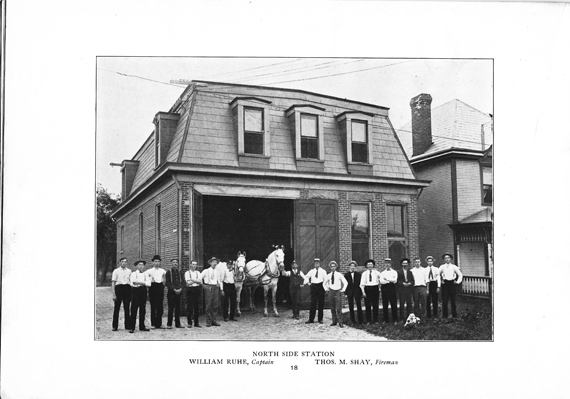
The Present Department
Perhaps no fire department in the country has had more to contend with and succeeded better than the organization now being maintained in East Liverpool. Due. principally to the rapid growth of the community, the widely separated and hilly suburban districts-making it necessary for separate stations-and finally, the lack of funds that could be legally applied to increasing the number of firemen, it has been a difficult matter to keep astride of the times. Those having from time to time headed the legislative department of the city government have been as liberal in their appropriations as the law would permit, but the men who face danger and death upon the occasion of every fire call are woefully lacking in fire fighting equipment and proper facilities to meet the demands in a city the size and importance East Liverpool has now attainded. At Central Station the small quota of men handle a three-way hitch chemical wagon, a very heavy hook and ladder truck and a Silsby Steamer - now useless - caring for the number of splendid horses required to operate the whole. Withall, the general attitude of the men is most cheerful, their willingness to respond promptly is the subject of favorable comment while their sense of duty is remarked upon in every quarter. Two deaths have occurred in the last decade-Charles H. Rose, who succumbed to pnuemonia following exposure at a fire, and George W. Bettridge, who fell from a pole while repairing the alarm lines. Both were brave men, efficient and fearless firemen and were sorely missed from the Central Station where they were previously quartered.
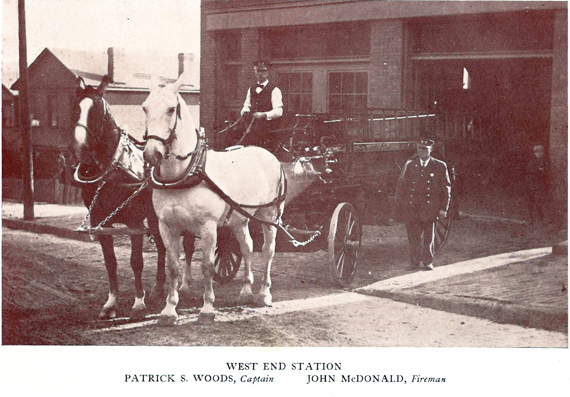
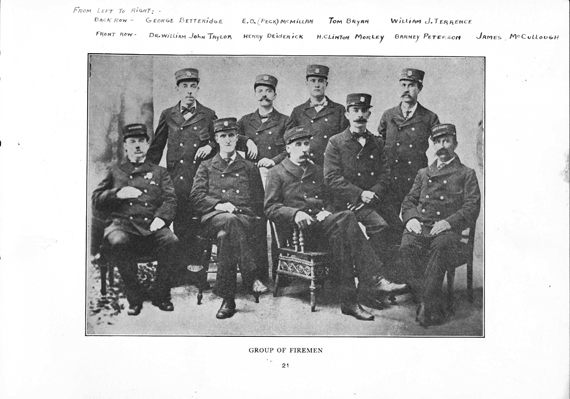
Contiune to Fire Department
This site is the property of the East Liverpool Historical Society.
Regular linking, i.e. providing the URL of the East Liverpool Historical Society web site for viewers to click on and be taken to the East Liverpool Historical Society entry portal or to any specific article on the website is legally permitted.
Hyperlinking, or as it is also called framing, without permission is not permitted.
Legally speaking framing is still in a murky area of the law though there have been court cases in which framing has been seen as violation of copyright law. Many cases that were taken to court ended up settling out-of-court with the one doing the framing agreeing to cease framing and to just use a regular link to the other site.
The East Liverpool Historical Society pays fees to keep their site online. A person framing the Society site is effectively presenting the entire East Liverpool Historical Society web site as his own site and doing it at no cost to himself, i.e. stealing the site.
The East Liverpool Historical Society reserves the right to charge such an individual a fee for the use of the Society’s material.